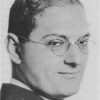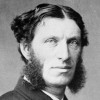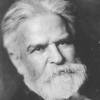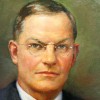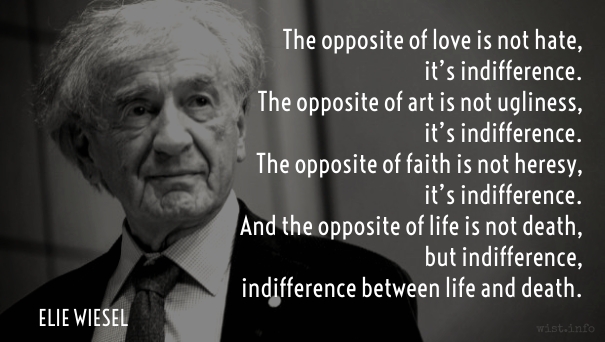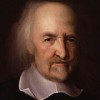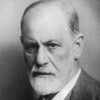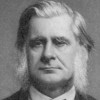Cruel and savage as orthodoxies have always proved to be, the faithful seem able to convince themselves that the heretics, as they continue to crop up, get nothing worse than their due, and to rest with an easy conscience.
Learned Hand (1872-1961) American jurist
Speech (1955-01-29), “A Fanfare for Prometheus,” American Jewish Committee annual dinner, New York City
(Source)
Quotations about:
heresy
Note not all quotations have been tagged, so Search may find additional quotes on this topic.
It is customary to suppose that, if a belief is widespread, there must be something reasonable about it. I do not think this view can be held by anyone who has studied history. Practically all the beliefs of savages are absurd. In early civilizations there may be as much as one percent for which there is something to be said. In our own day …. But at this point I must be careful. We all know that there are absurd beliefs in Soviet Russia. If we are Protestants, we know that there are absurd beliefs among Catholics. If we are Catholics, we know that there are absurd beliefs among Protestants. If we are Conservatives, we are amazed by the superstitions to be found in the Labour Party. If we are Socialists, we are aghast at the credulity of Conservatives. I do not know, dear reader, what your beliefs may be, but whatever they may be, you must concede that nine-tenths of the beliefs of nine-tenths of mankind are totally irrational. The beliefs in question are, of course, those which you do not hold.
Bertrand Russell (1872-1970) English mathematician and philosopher
“Is There a God?” (1952)
(Source)
Essay commissioned by Illustrated magazine in 1952, but never published there. First publication in Russell, Last Philosophical Testament, 1943-68 (1997) [ed. Slater/Köllner].
For, does the reader inquire into the subject-matter of controversy in this case; what the difference between Orthodoxy or My-doxy and Heterodoxy or Thy-doxy might here be?
Thomas Carlyle (1795-1881) Scottish essayist and historian
The French Revolution: A History, Part 2, Book 4, ch. 2 (2.4.2) (1837)
(Source)
Heretical views arise when the truth is uncertain, and it is only when the truth is uncertain that censorship is invoked.
Bertrand Russell (1872-1970) English mathematician and philosopher
“The Value of Free Thought” (1944)
(Source)
My opinion is that there would never have been an infidel, if there had never been a priest. The artificial structures they have built on the purest of all moral systems, for the purpose of deriving from it pence and power, revolts those who think for themselves, and who read in that system only what is really there.
Thomas Jefferson (1743-1826) American political philosopher, polymath, statesman, US President (1801-09)
Letter to Margaret Bayard Smith (6 Aug 1816)
(Source)
I can consequently assure you that no kingdom has ever existed with as many civil wars as occur in the kingdom of Christ.
[Aussi puis-je t’assurer qu’il n’y a jamais eu de royaume où il y ait eu tant de guerres civiles que dans celui de Christ.]Charles-Lewis de Secondat, Baron de Montesquieu (1689-1755) French political philosopher
Persian Letters [Lettres Persanes], Letter 29, Rica to Ibben (1721) [tr. Mauldon (2008)]
(Source)
(Source (French)). Alternate translations:
And accordingly I can assure thee there never was a Kingdom that had so many Civil Wars in it, as that of Christ.
[tr. Ozell (1736), Letter 27]
I can also affirm to thee that there never was a kingdom where there has been so many civil wars as in that of Christ.
[tr. Floyd (1762)]
I can also assure you that there never was a realm in which so many civil wars have broken out, as in the kingdom of Christ.
[tr. Davidson (1891)]
Consequently, I am able to assure you that there never has been a kingdom in which there have been so many civil wars as in that of Christ.
[tr. Betts (1897)]
I can also assure you that there has never been a realm so prone to civil wars as that of Christ.
[tr. Healy (1964)]
I assure you that no countries have had as many civil wars as those in the realm of Christ.
[tr. MacKenzie (2014)]
A faith is dead when no one can think of a heresy.
James Richardson (b. 1950) American poet
“Vectors: 56 Aphorisms and Ten-second Essays,” Michigan Quarterly Review, # 40 (Spring 1999)
(Source)
Heresy is only another word for freedom of thought.
Graham Greene (1904-1991) English novelist [Henry Graham Greene]
“Freedom of Thought,” speech accepting the Jerusalem Prize (6 Apr 1981)
(Source)
Idiot, not to know
his days are numbered who would fight the gods!
His children will not sing around his knees
“Papà! Papà!” on his return from war.Ὅττι μάλ’ οὐ δηναιὸς ὃς ἀθανάτοισι μάχηται,
οὐδέ τί μιν παῖδες ποτὶ γούνασι παππάζουσιν
ἐκ πολέμοιο καὶ αἰνῆς δηϊοτῆτος.Homer (fl. 7th-8th C. BC) Greek author
The Iliad [Ἰλιάς], Book 5, l. 407ff (5.407-409) (c. 750 BC) [tr. Fitzgerald (1974), l. 467ff]
(Source)
Alt. trans.:
Not knowing he that fights with Heav’n hath never long to live,
And for this deed, he never shall have child about his knee
To call him father, coming home.
[tr. Chapman (1611), ll. 387-89]
No man who fights with gods will live long or hear his children prattling about his knees when he returns from battle.
[tr. Butler (1898)]
Know thou, whoe'er with heavenly power contends,
Short is his date, and soon his glory ends;
From fields of death when late he shall retire,
No infant on his knees shall call him sire.
[tr. Pope (1715-20)]
Infatuate! he forgets
That whoso turns against the Gods his arm
Lives never long; he never, safe escaped
From furious fight, the lisp’d caresses hears
Of his own infants prattling at his knees.
[tr. Cowper (1791), ll. 474-78]
Infatuate! nor does the son of Tydeus know this in his mind, that he is by no means long-lived who fights with the immortals, nor ever at his knees will sons lisp a father’s name, as he returns from war and dreadful battle.
[tr. Buckley (1860)]
Unknowing he how short his term of life
Who fights against the Gods! for him no child
Upon his knee shall lisp a father's name,
Safe from the war and battle-field return'd.
[tr. Derby (1864), ll. 463-466]
Verily he endureth not for long who fighteth with the immortals, nor do his children prattle about his knees when he is come back from war and the dread conflict.
[tr. Murray (1924)]
That man who fights the immortals lives for no long time, his children do not gather to his knees to welcome their father when he returns home after the fighting and the bitter warfare.
[tr. Lattimore (1951)]
Doesn't the son of Tydeus know, down deep,
the man who fights the gods does not live long?
Nor do his children ride his knees with cries of 'Father' --
home at last from the wars and heat of battle.
[tr. Fagles (1990), ll. 465-468]
It ain’t necessarily so,
It ain’t necessarily so —
De t’ings dat you li’ble
To read in de Bible —
It ain’t necessarily so.Ira Gershwin (1896-1983) American lyricist [b. Israel Gershowitz]
“It Ain’t Necessarily So,” Porgy and Bess, Act 2, sc. 2 (1935)
(Source)
It is a truism that almost any sect, cult, or religion will legislate its creed into law if it acquires the political power to do so, and will follow it by suppressing opposition, subverting all education to seize early the minds of the young, and by killing, locking up, or driving underground all heretics. This is equally true whether the faith is Communism or Holy-Rollerism; indeed it is the bounden duty of the faithful to do so. The custodians of the True Faith cannot logically admit tolerance of heresy to be a virtue.
Robert A. Heinlein (1907-1988) American writer
“Concerning Stories Never Written” (Oct 1952)
(Source)
Religious discord has lost her sting; the cumbrous weapons of theological warfare are antiquated: the field of politics supplies the alchymists of our times with materials of more fatal explosion, and the butchers of mankind no longer travel to another world for instruments of cruelty and destruction. Our age is too enlightened to contend upon topics, which concern only the interests of eternity; and men who hold in proper contempt all controversies about trifles, except such as inflame their own passions, have made it a common-place censure against your ancestors, that their zeal was enkindled by subjects of trivial importance; and that however aggrieved by the intolerance of others, they were alike intolerant themselves. Against these objections, your candid judgment will not require an unqualified justification; but your respect and gratitude for the founders of the State may boldly claim an ample apology. The original grounds of their separation from the church of England, were not objects of a magnitude to dissolve the bonds of communion; much less those of charity, between Christian brethren of the same essential principles.
Surely there is no better way to stop the rising of new sects and schisms than to reform abuses; to compound the smaller differences; to proceed mildly, and not with sanguinary persecutions; and rather to take off the principal authors by winning and advancing them, than to enrage them by violence and bitterness.
Francis Bacon (1561-1626) English philosopher, scientist, author, statesman
“Of Vicissitude of Things,” Essays, No. 58 (1625)
(Source)
The freethinking of one age is the common sense of the next.
If these writings of the Greeks agree with the book of God, they are useless and need not be preserved; if they disagree, they are pernicious and ought to be destroyed.
Umar I (c. 583-644) Arab caliph, jurist [Omar, Umar ibn Al-Khattāb, Al-Farooq]
(Attributed)
Ordering the burning of the Library of Alexandria in AD 641, as quoted in Edward Gibbon, The Decline and Fall of the Roman Empire (1776-88). The story is generally considered spurious. More discussion here. Alt. trans.: "They will either contradict the Koran, in which case they are heresy, or they will agree with it, so they are superfluous"
What havoc has been made of Books through every Century of the Christian Æra? Where are fifty Gospells condemned as spurious by the Bull of Pope Gelasius. Where are the forty Waggon Loads of Hebrew Manuscripts burned in France by order of another Pope, because suspected of Heresy? Remember the Index expurgatorius, the Inquisitions, the Stake, the Axe the halter and the Guillotine; and Oh! horrible the Rack. This is as bad if not worse than a slow fire.
John Adams (1735-1826) American lawyer, Founding Father, statesman, US President (1797-1801)
Letter to John Taylor (14 Dec 1814)
(Source)
It would be almost unbelievable, if history did not record the tragic fact that men have gone to war and cut each other’s throat because they could not agree as to what was to become of them after their throats were cut. Many sins have been committed in the name of religion. Alas! the spirit of proscription is never kind. It is the unhappy quality of religious disputes that they are always bitter. For some reason, too deep to fathom, men contend more furiously over the road to heaven, which they cannot see, than over their visible walks on earth.
The care of every man’s soul belongs to himself. But what if he neglect the care of it? Well what if he neglect the care of his health or estate, which more nearly relate to the state? Will the magistrate make a law that he shall not be poor or sick? Laws provide against injury from others, but not from ourselves. God himself will not save men against their wills.
Thomas Jefferson (1743-1826) American political philosopher, polymath, statesman, US President (1801-09)
“Notes on Religion” (1776-10?)
(Source)
Labeled by Jefferson "Scraps Early in the Revolution."
But a short time elapsed after the death of the great reformer of the Jewish religion before his principles were departed from by those who professed to be his special servants, & perverted into an engine for enslaving mankind, and aggrandizing their oppressors in church & state: that the purest system of morals ever before preached to man has been adulterated & sophisticated, by artificial constructions, into a mere contrivance to filch wealth & power to themselves, that rational men not being able to swallow their impious heresies, in order to force them down their throats, they raise the hue & cry of infidelity, while themselves are the greatest obstacles to the advancement of the real doctrines of Jesus, and do in fact constitute the real Anti-Christ.
Thomas Jefferson (1743-1826) American political philosopher, polymath, statesman, US President (1801-09)
Letter to William Baldwin (unsent) (19 Jan 1810)
(Source)
From the dissensions among Sects themselves arise necessarily a right of choosing and necessity of deliberating to which we will conform. But if we choose for ourselves, we must allow others to choose also, and so reciprocally, this establishes religious liberty.
Thomas Jefferson (1743-1826) American political philosopher, polymath, statesman, US President (1801-09)
“Notes on Religion” (1776-10?)
(Source)
Labeled by Jefferson "Scraps Early in the Revolution." Modern rendering. Original:
From the dissensions among sects themselves arises necessarily a right of chusing & necessity of deliberating to which we will conform, but if we chuse for ourselves, we must allow others to chuse also, & to reciprocally. This establishes religious liberty.
Another and more special provision has been made by one of the amendments to the Constitution, which expressly declares, that “Congress shall make no law respecting an establishment of religion, or prohibiting the free exercise thereof, or abridging the freedom of speech, or of the press,” thereby guarding, in the same sentence, and under the same words, the freedom of religion, of speech, and of the press, insomuch that whatever violated either throws down the sanctuary which covers the others, — and that libels, falsehood, and defamation, equally with heresy and false religion, are withheld from the cognizance of federal tribunals.
Thomas Jefferson (1743-1826) American political philosopher, polymath, statesman, US President (1801-09)
“Kentucky Resolutions,” Resolution 3 (1798)
(Source)
In protest of the Alien and Sedition Acts.
Well aware that the opinions and belief of men depend not on their own will, but follow involuntarily the evidence proposed to their minds; that Almighty God hath created the mind free, and manifested his supreme will that free it shall remain by making it altogether insusceptible of restraint; that all attempts to influence it by temporal punishments, or burthens, or by civil incapacitations, tend only to beget habits of hypocrisy and meanness, and are a departure from the plan of the holy author of our religion, who being lord both of body and mind, yet chose not to propagate it by coercions on either, as was in his Almighty power to do, but to extend it by its influence on reason alone; that the impious presumption of legislators and rulers, civil as well as ecclesiastical, who, being themselves but fallible and uninspired men, have assumed dominion over the faith of others, setting up their own opinions and modes of thinking as the only true and infallible, and as such endeavoring to impose them on others, hath established and maintained false religions over the greatest part of the world and through all time ….
Thomas Jefferson (1743-1826) American political philosopher, polymath, statesman, US President (1801-09)
“Virginia Statute for Religious Freedom,” Preamble (1776-06-18; enacted 1786-01-16)
(Source)
During final debate around the bill's passage:See Jefferson's discussion about a failed amendment to the preamble here.
- the first clause was struck, changing the beginning to "Whereas Almighty God ...."
- the phrase "and manifested his supreme will that free it shall remain by making it altogether insusceptible of restraint" was struck.
- the phrase "but to extend it by its influence on reason alone" was struck.
What is blasphemy? I will give you a definition; I will give you my thought upon this subject. What is real blasphemy?
To live on the unpaid labor of other men — that is blasphemy.
To enslave your fellow-man, to put chains upon his body — that is blasphemy.
To enslave the minds of men, to put manacles upon the brain, padlocks upon the lips — that is blasphemy.
To deny what you believe to be true, to admit to be true what you believe to be a lie — that is blasphemy.
To strike the weak and unprotected, in order that you may gain the applause of the ignorant and superstitious mob — that is blasphemy.
To persecute the intelligent few, at the command of the ignorant many — that is blasphemy.
To forge chains, to build dungeons, for your honest fellow-men — that is blasphemy.
To pollute the souls of children with the dogma of eternal pain — that is blasphemy.
To violate your conscience — that is blasphemy.
The jury that gives an unjust verdict, and the judge who pronounces an unjust sentence, are blasphemers.
The man who bows to public opinion against his better judgment and against his honest conviction, is a blasphemer.Robert Green Ingersoll (1833-1899) American lawyer, agnostic, orator
Trial of C.B. Reynolds for blasphemy (May 1887)
(Source)
According to the theologians, God, the Father of us all, wrote a letter to his children. The children have always differed somewhat as to the meaning of this letter. In consequence of these honest differences, these brothers began to cut out each other’s hearts. In every land, where this letter from God has been read, the children to whom and for whom it was written have been filled with hatred and malice. They have imprisoned and murdered each other, and the wives and children of each other. In the name of God every possible crime has been committed, every conceivable outrage has been perpetrated. Brave men, tender and loving women, beautiful girls, and prattling babes have been exterminated in the name of Jesus Christ.
Robert Green Ingersoll (1833-1899) American lawyer, agnostic, orator
“Heretics and Heresies” (1874)
(Source)
Monty Python’s usual schoolboy humour is here let loose on a period of history appropriately familiar to every schoolboy in the West, and a faith which could be shaken by such good-humoured ribaldry would be a very precarious faith indeed.
Heresy is what the minority believe; it is the name given by the powerful to the doctrine of the weak.
Robert Green Ingersoll (1833-1899) American lawyer, agnostic, orator
“Heretics and Heresies” (1874)
(Source)
Any sufficiently advanced prejudicial piety is indistinguishable from hatred.
Unreason and anti-intellectualism abominate thought. Thinking implies disagreement; and disagreement implies nonconformity; and nonconformity implies heresy; and heresy implies disloyalty — so, obviously, thinking must be stopped. But shouting is not a substitute for thinking and reason is not the subversion but the salvation of freedom.
Adlai Stevenson (1900-1965) American diplomat, statesman
Call to Greatness, ch. 3 “America’s Burden” (1954)
(Source)
Adapted from his "A Troubled World," Godkin Lectures, Harvard University (1954-03-17 - 1954-03-20)
I will not attack your doctrines nor your creeds if they accord liberty to me. If they hold thought to be dangerous — if they aver that doubt is a crime, then I attack them one and all, because they enslave the minds of men.
Indifference, to me, is the epitome of evil.
The opposite of love is not hate, it’s indifference.
The opposite of art is not ugliness, it’s indifference.
The opposite of faith is not heresy, it’s indifference.
And the opposite of life is not death, but indifference,
indifference between life and death.Elie Wiesel (1928-2016) Romanian-American novelist, professor, political activist, Nobel Laureate.
“One Must Not Forget,” interview by Alvin P. Sanoff, US News & World Report (27 Oct 1986)
See also Nietzsche.
Standing in the presence of the Unknown, all have the same right to think, and all are equally interested in the great question of origin and destiny. All I claim, all I plead for, is liberty of thought and expression. That is all.
I do not say, and I do not believe, that Christians are as bad as their creeds. In spite of church and dogma, there have been millions and millions of men and women true to the loftiest and most generous promptings of the human heart. They have been true to their convictions, and, with a self-denial and fortitude excelled by none, have labored and suffered for the salvation of men. Imbued with the spirit of self-sacrifice, believing that by personal effort they could rescue at least a few souls from the infinite shadow of hell, they have cheerfully endured every hardship and scorned every danger. And yet, notwithstanding all this, they believed that honest error was a crime. They knew that the Bible so declared, and they believed that all unbelievers would be eternally lost. They believed that religion was of God, and all heresy of the devil. They killed heretics in defence of their own souls and the souls of their children. They killed them because, according to their idea, they were the enemies of God, and because the Bible teaches that the blood of the unbeliever is a most acceptable sacrifice to heaven.
Robert Green Ingersoll (1833-1899) American lawyer, agnostic, orator
“Heretics and Heresies” (1874)
(Source)
No orthodox church ever had power that it did not endeavor to make people think its way by force and flame.
Robert Green Ingersoll (1833-1899) American lawyer, agnostic, orator
Trial of C.B. Reynolds for blasphemy (May 1887)
(Source)
How has the church in every age, when in authority, defended itself? Always by a statute against blasphemy, against argument, against free speech. And there never was such a statute that did not stain the book that it was in and that did not certify to the savagery of the men who passed it.
Robert Green Ingersoll (1833-1899) American lawyer, agnostic, orator
Trial of C.B. Reynolds for blasphemy (May 1887)
(Source)
Give any orthodox church the power, and to-day they would punish heresy with whip, and chain, and fire. As long as a church deems a certain belief essential to salvation, just so long it will kill and burn if it has the power.
Robert Green Ingersoll (1833-1899) American lawyer, agnostic, orator
“Heretics and Heresies” (1874)
(Source)
You cannot change the conclusion of the brain by torture; nor by social ostracism. But I will tell you what you can do by these, and what you have done. You can make hypocrites by the million. You can make a man say that he has changed his mind; but he remains of the same opinion still. Put fetters all over him; crush his feet in iron boots; stretch him to the last gasp upon the holy rack; burn him, if you please, but his ashes will be of the same opinion still.
Robert Green Ingersoll (1833-1899) American lawyer, agnostic, orator
“The Liberty of Man, Woman, and Child” (1877)
(Source)
Why should man be afraid to think, and why should he fear to express his thoughts? Is it possible that an infinite Deity is unwilling that a man should investigate the phenomena by which he is surrounded? Is it possible that a god delights in threatening and terrifying men? What glory, what honor and renown a god must win on such a field! The ocean raving at a drop; a star envious of a candle; the sun jealous of a fire-fly.
Robert Green Ingersoll (1833-1899) American lawyer, agnostic, orator
“Heretics and Heresies” (1874)
(Source)
Men and women have been burned for thinking there is but one God; that there was none; that the Holy Ghost is younger than God; that God was somewhat older than his son; for insisting that good works will save a man without faith; that faith will do without good works; for declaring that a sweet babe will not be burned eternally, because its parents failed to have its head wet by a priest; for speaking of God as though he had a nose; for denying that Christ was his own father; for contending that three persons, rightly added together, make more than one; for believing in purgatory; for denying the reality of hell; for pretending that priests can forgive sins; for preaching that God is an essence; for denying that witches rode through the air on sticks; for doubting the total depravity of the human heart; for laughing at irresistible grace, predestination and particular redemption; for denying that good bread could be made of the body of a dead man; for pretending that the pope was not managing this world for God, and in the place of God; for disputing the efficacy of a vicarious atonement; for thinking the Virgin Mary was born like other people; for thinking that a man’s rib was hardly sufficient to make a good-sized woman; for denying that God used his finger for a pen; for asserting that prayers are not answered, that diseases are not sent to punish unbelief; for denying the authority of the Bible; for having a Bible in their possession; for attending mass, and for refusing to attend; for wearing a surplice; for carrying a cross, and for refusing; for being a Catholic, and for being a Protestant; for being an Episcopalian, a Presbyterian, a Baptist, and for being a Quaker.
Robert Green Ingersoll (1833-1899) American lawyer, agnostic, orator
“Heretics and Heresies” (1874)
(Source)
Heretics have been hateful from the beginning of recorded time; they have been ostracized, exiled, tortured, maimed, and butchered; but it has generally proved impossible to smother them; and when it has not, the society that has succeeded has always declined.
Learned Hand (1872-1961) American jurist
“A Fanfare for Prometheus,” speech, American Jewish Committee (1955-01-29)
(Source)
I know a number of highly sensitive and intelligent people in my own communion who consider as a heresy my faith that God’s loving concern for his creation will outlast all our willfulness and pride. No matter how many eons it takes, he will not rest until all of creation, including Satan, is reconciled to him, until there is no creature who cannot return his look of love with a joyful response of love […] Some people feel it to be heresy because it appears to deny man his freedom to refuse to love God. But this, it seems to me, denies God his freedom to go on loving us beyond all our willfulness and pride. If the Word of God is the light of the world, and this light cannot be put out, ultimately it will brighten all the dark corners of our hearts and we will be able to see, and seeing, will be given the grace to respond with love — and of our own free will.
Burning stakes do not lighten the darkness.
Stanislaw Lec (1909-1966) Polish aphorist, poet, satirist
Unkempt Thoughts [Myśli nieuczesane] (1957) [tr. Gałązka (1962)]
(Source)
It is contended by many that ours is a Christian government, founded upon the Bible, and that all who look upon the book as false or foolish are destroying the foundation of our country. The truth is, our government is not founded upon the rights of gods, but upon the rights of men. Our Constitution was framed, not to declare and uphold the deity of Christ, but the sacredness of humanity. Ours is the first government made by the people and for the people. It is the only nation with which the gods have had nothing to do. And yet there are some judges dishonest and cowardly enough to solemnly decide that this is a Christian country, and that our free institutions are based upon the infamous laws of Jehovah.
On the necessary points, unity. On the questionable points, liberty. In everything, love.
[In necessariis unites, in non necessariis libertas, in omnibus caritas.]
Rupertus Meldenius (1582-1651) German writer [pseud. of Peter Meiderlin]
Paraenesis Votiva pro Pace Ecclesiae ad Theologos Augustanae Confessionis [Votive Counsel for the Peace of the Church, to the Theologians of the Augustan Confession] (1626)
Also translated as "essentials" and "non-essentials."
Paraphrase of final lines of the work:
Verbo dicam: Si nos servaremus IN necesariis Unitatem, IN non-necessariis Libertatem, IN UTRISQUE Charitatem, optimo certe loco essent res nostrae.
[In a word, were we to observe unity in essentials, liberty in incidentals, and in all things charity, our affairs would be certainly in a most happy situation.]
Commonly attributed to St Augustine, but also to John Wesley, Richard Baxter, and several others.
But it’s no show just to protect the serious, the solemn, and the high-minded. We must protect the flippant, the zany, the heretical, and the downright queer. The Constitution gives every American the inalienable right to make a damn fool of himself.
From the same it proceedeth that men give different names to one and the same thing from the difference of their own passions: as they that approve a private opinion call it opinion; but they that mislike it, heresy: and yet heresy signifies no more than private opinion; but has only a greater tincture of choler.
Christians have burnt each other, quite persuaded
That all the Apostles would have done as they did.
What progress we are making. In the Middle Ages they would have burned me. Now they are content with burning my books.
Sigmund Freud (1856-1939) Austrian psychoanalyst and neurologist
Letter to Ernest Jones (Jan 1933)
(Source)
Regarding Nazi book burnings in Germany. Reprinted in Jones, Sigmund Freud: Life and Work, Vol. 3, Part 1, ch. 4 (1957).
History warns us, however, that it is the customary fate of new truths to begin as heresies and to end as superstitions; and, as matters now stand, it is hardly rash to anticipate that, in another twenty years, the new generation, educated under the influences of the present day, will be in danger of accepting the main doctrines of the ‘Origin of Species’ with as little reflection, and it may be with as little justification, as so many of our contemporaries, twenty years ago, rejected them. Against any such a consummation let us all devoutly pray; for the scientific spirit is of more value than its products, and irrationally held truths may be more harmful than reasoned errors.
T. H. Huxley (1825-1895) English biologist [Thomas Henry Huxley]
“The Coming of Age of The Origin of Species,” lecture, Royal Institution (19 Mar 1880)
(Source)
First printed in Nature: A Weekly Illustrated Journal of Science (6 May 1880).










